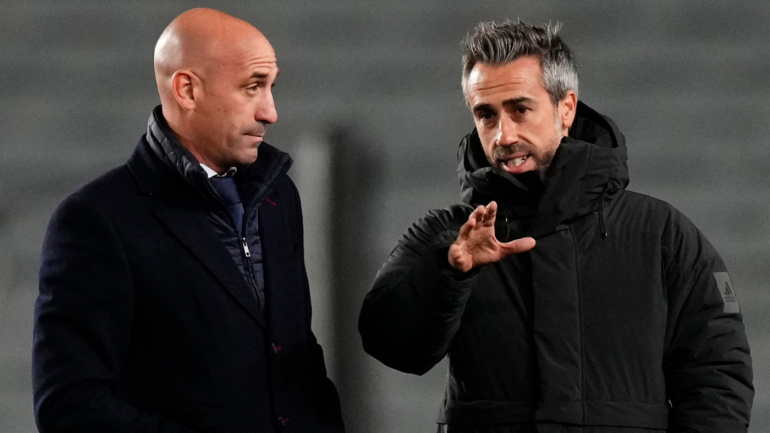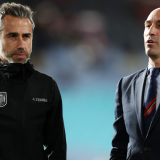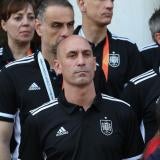
In a shocking speech on Friday, the president of Spain's FA, Luis Rubiales defied mounting pressure and announced he wouldn't resign from his position after forcibly kissing Jennifer Hermoso during the team's celebration after they won their first Women's World Cup final vs. England on Sunday 1-0 It's the latest chapter in a set of controversies that has strained relations between the players on Spain's national team and their coaches and leadership at the FA over the last year.
Here's everything you need to know about the interlocking set of issues:
Spain's women object to working conditions
In September 2022, 15 players sent the federation separate but identical emails asking not to be called up to the national team, citing a lack of professionalism that each player wrote had an "important effect on my emotional state and by extension my health." They demanded "a clear commitment to a professional project with attention paid to all the aspects needed to get the best performance of this group of players" in the email.
The 15 players were Aitana Bonmati, Mariona Caldentey, Ona Batlle, Patri Guijarro, Mapi Leon, Sandra Panos, Claudia Pina, Lola Gallardo, Ainhoa Moraza, Nerea Eizagirre, Amaiur Sarriegi, Lucia Garcia, Leila Ouahabi, Laia Aleixandri and Andrea Pereira. Three additional players who did not send emails voiced their support for the others: Alexia Putellas, Jennifer Hermoso, and captain Irene Paredes.

Golazo Starting XI Newsletter
Get your Soccer Fix from Around the Globe
Your ultimate guide to the Beautiful Game as our experts take you beyond the pitch and around the globe with news that matters.
Thanks for signing up!
Keep an eye on your inbox.
Sorry!
There was an error processing your subscription.
According to The Athletic, among the players' complaints was insufficient preparation for matches, from arriving to host cities too late and traveling by bus when planes would be considered the practical choice. The players also reportedly had issues with several coaches, alleging they were asked them to keep their hotel room doors open until midnight and inspected their bags after they went on excursions during camps. The players never explicitly asked for head coach Jorge Vilda or his coaching staff to be fired, but it was clear the relationship between them was fractured.
Instead of taking the players' complaints seriously, though, the federation instantly backed Vilda and criticized those who protested. Ana Alvarez, head of women's soccer at the federation, said that players would need to apologize before they were welcomed back onto the team, and added that "the federation comes first."
Those 18 players missed a handful of Spain friendlies that fall, including an October friendly against the U.S. women's national team that a depleted squad eventually won, but things started to change in the winter. Hermoso returned to the team in February and then talks between the players and Alvarez began in March. Paredes then rejoined the team in March, and Putellas returned soon after recovering from an ACL tear in April.
A handful of players felt optimistic about the progress in discussion with the federation, which included hiring more support staff and improved travel conditions plus more freedom during camp. Eight of the 15 players who sent emails in September, as a result, made themselves available for selection on the World Cup team. Three eventually made the cut -- Bonmati, Caldentey, and Batlle.
Don't miss CBS Sports Golazo Network's Morning Footy, now in podcast form! Our crew brings you all the news, views, highlights and laughs you need to follow the Beautiful Game in every corner of the globe, every Monday-Friday all year long
Three players -- Leon, Guijarro, and Pina -- notably said the changes were not enough for them to change their stance. "Mapi Leon has a way of life and values," Leon said in June, per RAC1. "I can't go back if the situation doesn't change … There has to be changes. I'm not saying that they're not doing it, but I don't see them. What saddens me the most is that I really have to miss out on something when I could have earned it and contributed. It's a shame."
The divide was hard to ignore as Spain won their first Women's World Cup title, where players initially celebrated the victory without the coaching staff and Vilda was booed twice by the 75,000-plus fans at Stadium Australia. The women's team also posted a photo of Vilda with the caption "Vilda in" on X, formerly known as Twitter, following the match.
Rubiales forcibly kisses Hermoso
The argument that the Spanish federation's lack of professionalism, though, was bolstered in Sydney after president Luis Rubiales forcibly kissed Hermoso as the players received their winners' medals. Rubiales initially described criticism of his actions as "idiocy [that] should be ignored," but apologized the following day. He then faced increasing calls to resign and criticism from politicians and soccer players alike, including Megan Rapinoe.
"It made me think about how much we are required to endure," the U.S. women's national team star told The Atlantic. "Think how much that Spanish team had to shoulder: Some of the players who stood up way back last year [to protest poor treatment by their coach and federation] still aren't on the team. Maybe that was something that galvanized them, but you shouldn't have to have that."
Rubiales and his allies have also reportedly tried to save face and failed since the incident. The federation issued a statement on Hermoso's behalf that described the incident as a "mutual gesture," but she was not involved with the creation of the statement. Rubiales also reportedly pleaded with her to be in the apology video, while Vilda reached out to her family on three occasions on Rubiales' behalf.
Hermoso has only briefly spoken publicly about the incident, expressing her discomfort in a post-match Instagram live from the locker room: "Eh...yeah, I did not enjoy that."
Rubiales' inappropriate conduct has shone a new spotlight on longstanding issues at the Spanish federation that previously received limited attention from the media and other power brokers in the sport. It also applies more pressure than ever before on Rubiales, Vilda, and other federation higher-ups who have largely escaped consequences for their disregard of the women's game -- and perhaps the best shot yet at enacting change that many have long advocated for.
Rubiales remains defiant
It seemed as if all of the pressure was going to force the Spain boss to finally quit. The federation called an emergency meeting, and it was widely reported that Rubiales would resign at that meeting. Instead, in a fiery speech, he took to the podium and not only refused to step aside, but offered Vilda a new four-year contract.
Painting himself as the victim of a witch hunt, Rubiales decried "false feminism" and described the moment between him and Hermoso as "spontaneous, mutual and consensual," adding it was "like one he would give to one of his daughters."
It's now up to the Spanish government to step in if Rubiales is to be removed from running the program.






















